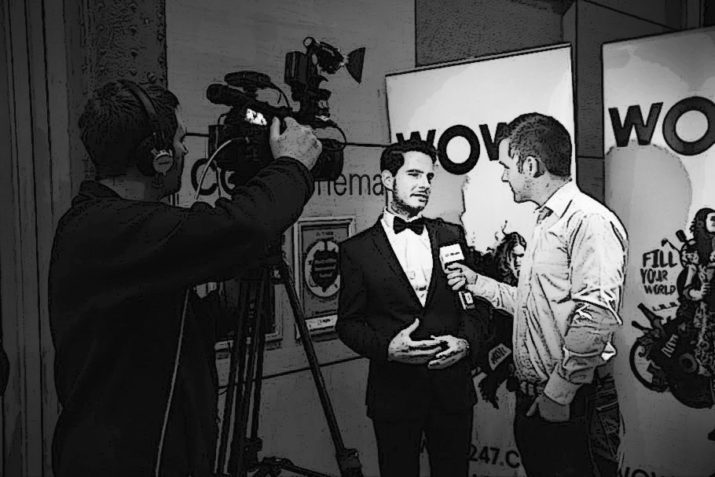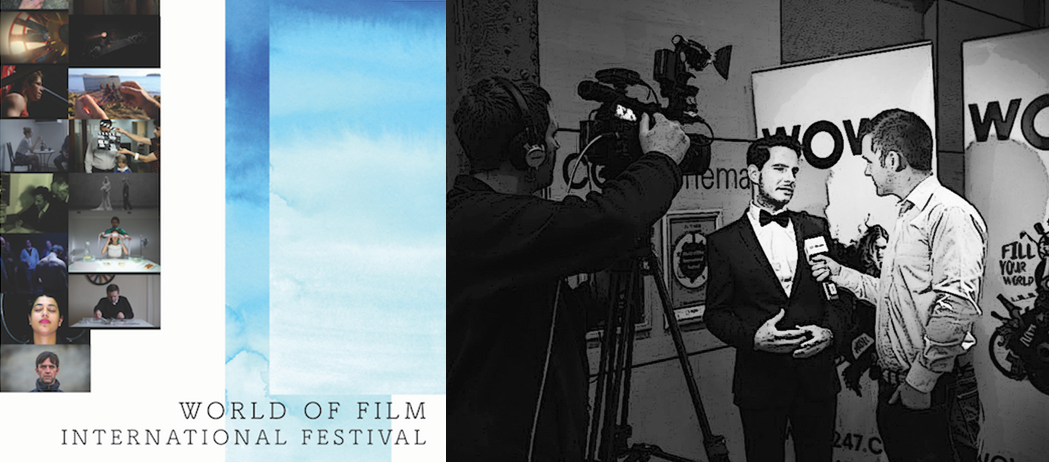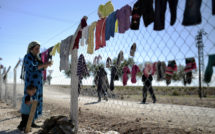

I sat down with Martin Petrov, director of the World of Film International Festival held annually in Glasgow, Scotland. He is also the festival coordinator of the Montreal International Animation Film Festival. WoFF will host the EuropeNow Festival for the journal and the Council of European Studies as part of its International Conference of Europeanists from July 12 to 14.
—Jake Purcell for EuropeNow
EuropeNow Thanks so much for answering some questions for EuropeNow! We’re thrilled to be partnering with World of Film International Festival (WoFF) to bring a film festival component to the CES conference this year. First, I’d like to ask a couple of questions to help our readers get familiar with WoFF. How did the World of Film International Festival get started? What makes Glasgow a good home for this project?
Martin Petrov WoFF started as a single event during the Commonwealth Games in the summer of 2014. In 2015, the festival was rebranded and took the shape it has more or less today, with its main focus on women and first feature directors, bringing the work of independent filmmakers from all over the world to Glasgow. Now entering its fourth edition in 2017, WoFF has added a third strand to its core program, which focuses on cinema from the Balkans.
Glasgow is an interesting and fast developing art hub with a very well cultured audience. Its vibrant youth scene is especially interested in modern, independent, and contemporary art forms, including film and theater. The numerous film, TV, and art schools and faculties also increase the interest in and the necessity for art festivals of all kinds. This is exactly what WoFF contributes to.
EuropeNow What makes WoFF distinct from other festivals? What are the gaps you want the festival to fill?
Martin Petrov There is a significant amount of performing art, film, music, theater, and other festivals taking place in Glasgow, Edinburgh, and other cities and areas in Scotland. Our distinctive characteristic is definitely a focus on independent filmmaking. Most festivals around have a focus either on limited geographic regions (e.g. African, Polish, French, Italian film), or they’re designed to act as an “audience festival” to bring already successful or known titles from big film festivals around the globe — Cannes, Berlin, Toronto — to show to local audiences. In addition to showing only independent work from all over the world, we highlight female directors, first time filmmakers, and Balkan cinema. Our aim is to give the stage to young talent , as well as to create a platform for them to network and develop their projects.
EuropeNow At EuropeNow, we’re obviously very enthusiastic about the potential for the arts to address a huge array of questions about Europe and its future – that idea is right at the heart of the journal’s mission. Partnering with WoFF gives us the opportunity to draw attention to more artists using film to think about Europe. What was originally appealing to WoFF about partnering with the CES conference?
Martin Petrov Since the very beginning, WoFF has tried to tackle important issues and present topics that filmmakers from all over the world have wanted to address, explore, and even try to resolve through the art of film. Europe as a multicultural continent is definitely in the headlines these days, due not only to political issues, but also social, humanitarian, and fundamental issues. The arts are at the heart of those questions. In an attempt to provide additional exposure to regions that are less visible at local festivals, we introduced a focus on Balkan cinema in our last edition, which will continue in future editions of the festival.
When the proposal from CES came to us, it sounded like the perfect match, considering that European filmmakers have a very important role at this moment in history, and that they need their work to be showcased and to reach a broad audience; this way they contribute significantly to the decision-making process for vital events that affect the future of the current and next generations.
EuropeNow In addition to the EuropeNow prizes, you also offer awards in the categories of female perspective and Balkan cinema. What’s important to you about supporting these communities of filmmakers? And what binds these different focuses?
Martin Petrov Even today, it is quite rare to find festivals that have an entire section dedicated to female directors. It is only recently that women have had a more solid position in festivals, film events, and in the industry in general. Not only in Hollywood, but in the world of independent filmmaking, women are misrepresented and often not employed at certain positions. Their visibility in the public sphere as speakers and decision-makers has also been very limited up until quite recently. Glasgow, as a city, has a great feminist community and it contributes a great deal to the local fight for women’s rights in various social and work environments. If we can contribute to that by showcasing the work of women filmmakers every year, it is already a great success. And so far, the festival section has been warmly embraced by all of our submitters and supporters.
In regards to our focus on Balkan Cinema, it is an attempt to support these fast growing film cultures in Eastern Europe, where great examples of contemporary cinema have recently made their way to big festivals around the world. It is also an interesting experiment for the Scottish audiences to get a closer look at social development and changes across the continent, especially now with hot topics like immigration and Brexit affecting people’s day-to-day life.
EuropeNow WoFF is in its fourth iteration now, correct? What changes do you hope to see in the festival going forward?
Martin Petrov What has really made me proud of the festival is the good words from filmmakers and guests visiting to present their work. Due to limited funds from our side, the support from all of the filmmakers who made it to Glasgow in the past three editions of the festival has been enormous, and that’s the thing to be most thankful for. So far, the heart of WoFF has been independent filmmakers from all over the world who spent years self-funding their projects, have kept actively participating in festivals, and made their way in an extremely competitive industry.
As an aspiration for the years to follow, I would like to continue working alongside incredible and talented people, and I hope to be in a position to secure better support for their films, their rights as filmmakers and their ability to create and share their passion with the audience.
Martin Petrov is director of the World of Film International Festival, and the festival coordinator of the Montreal International Animation Film Festival.
Jake Purcell is the History in Action Research Associate at the Council for European Studies, and the EuropeNow Campus editor. He is a Ph.D. candidate in medieval history at Columbia University.
Published on February 16, 2017
Photo: Martin Petrov, Private
Photo: World of Film International Festival




